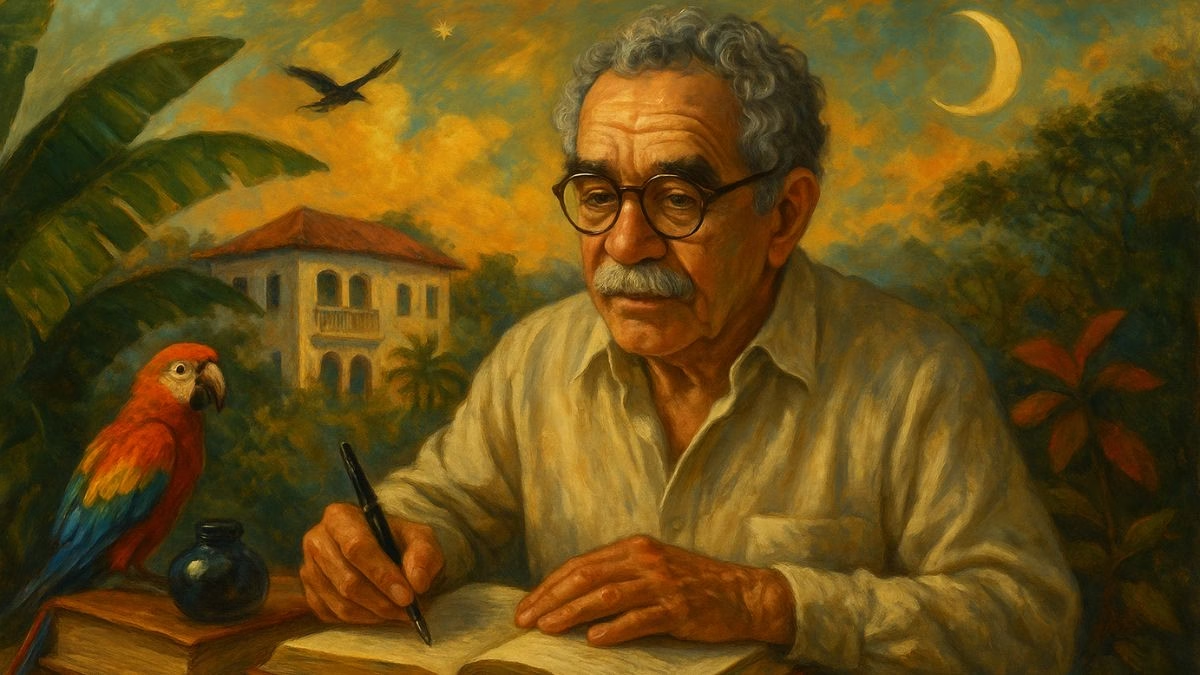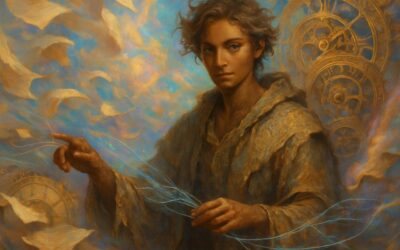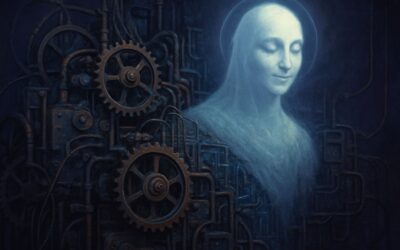In our last episode, we delved into the intense, soul-searching world of the great Russian novelists. They took reality and plunged it into the depths of the human psyche, exploring the darkest corners of guilt, faith, and suffering. Their world was intensely, painfully real.
But what happens when reality itself is the thing that’s gone haywire? What if the world outside your window is so filled with contradiction, so haunted by history, and so saturated with myth that the literary tools of realism just can’t do it justice? What kind of story do you write for a continent where a dictator can rule for decades, where ancient gods are still worshipped in secret, and where the past is not a foreign country but a ghost that sits down at your dinner table?
To find the answer, we must journey to 20th-century Latin America. This is a continent of staggering contrasts: of lush, impenetrable jungles and sprawling, hyper-modern cities; of deep-rooted indigenous cultures and the violent legacies of European colonialism; of passionate revolutions and brutal dictatorships. For centuries, its literature was often seen as a provincial echo of European trends. But in the middle of the 20th century, something exploded. A generation of writers, now known as “The Boom,” found a new voice, a new style, and a new confidence. They created a literature so bold, so innovative, and so intoxicating that it took the entire world by storm. They taught us that sometimes, the only way to tell the truth is to make it all up.
The Librarian of the Universe
Our story begins not with a bombastic novelist, but with a quiet, erudite, and nearly blind librarian in Buenos Aires, Argentina. Jorge Luis Borges was the intellectual godfather of the Boom. He was an older writer, a master of the short story, the essay, and the poem, and his work was a quiet revolution. He wasn’t interested in writing sprawling novels that reflected society. He was interested in using fiction to explore the very nature of reality, time, and infinity itself.
Borges’s stories are not “magical”; they are metaphysical. They are elegant, mind-bending intellectual puzzles, written with the precision of a watchmaker. He was the director of Argentina’s National Library, and his great subjects were books, libraries, mirrors, and labyrinths. He created a literature of ideas, a kind of philosophical fantasy that was utterly new.
A Garden of Forking Paths
To read Borges is to feel the solid ground of reality shift beneath your feet. In his story “The Garden of Forking Paths,” a World War I spy story becomes a mind-altering meditation on the nature of time. He imagines a book that is also a labyrinth, a novel where every event is followed by all its possible outcomes, each one branching off into a new, parallel reality, creating an infinite garden of forking paths.
In “Tlön, Uqbar, Orbis Tertius,” he imagines a secret society of scholars who invent a fictional planet, Tlön, with its own history, languages, and, most importantly, its own philosophy—a radical idealism where the world is nothing but a mental construct. The story starts as a quirky intellectual mystery, but then, things from the fictional world of Tlön begin to mysteriously appear in our world. The story is a chilling and playful exploration of how ideas and fictions can literally invade and reshape reality.
Perhaps his most famous story is “The Library of Babel.” It describes a universe in the form of a vast, possibly infinite library, composed of a honeycomb of hexagonal galleries. This library contains every single book that could possibly be written using a 25-symbol alphabet. It contains all the great works of literature, the cure for cancer, the true history of the universe. But for every coherent line, there are millions upon millions of pages of pure gibberish. The library contains all knowledge, but this knowledge is buried in an ocean of meaninglessness. It is a powerful and terrifying metaphor for the human search for meaning in a seemingly random cosmos.
Borges was a writer’s writer. He didn’t have the mass-market appeal of the later Boom novelists, but his influence was immense. He showed a new generation of Latin American writers that they didn’t have to be bound by European realism. He gave them permission to be playful, to be philosophical, and to invent their own worlds. He built the labyrinth, and the others would come and fill it with ghosts.
A Hundred Years of Solitude
If Borges was the quiet earthquake, then Gabriel García Márquez of Colombia was the volcanic eruption that followed. “Gabo,” as he was affectionately known, was the ultimate mythmaker, the writer who would become synonymous with the style that would define the Boom: Magical Realism.In 1967, he published a novel that would change the course of literary history: One Hundred Years of Solitude. The book was an instant, global sensation. It was a novel that felt completely new, yet as ancient as myth itself. It put Latin American literature firmly on the world stage and became the foundational text of Magical Realism.
Welcome to Macondo
One Hundred Years of Solitude is the saga of seven generations of the Buendía family, the founders of the mythical, isolated town of Macondo. The novel is a sprawling, dizzying, and utterly enchanting history of the town, from its Eden-like founding to its apocalyptic destruction a century later. It is, in miniature, the history of Latin America itself.
What made the novel so revolutionary was its style. Magical Realism, as Gabo perfected it, is not fantasy. It’s not a world where there are separate realms of magic and reality. It’s a world where the magical is an inseparable part of the real. The key is the narrative tone. The most outlandish, supernatural events are described in the same deadpan, matter-of-fact voice that a journalist would use to report on the weather.
For example, a local priest, Father Nicanor, demonstrates the existence of God by levitating several inches off the ground after drinking a cup of hot chocolate. When the family patriarch, José Arcadio Buendía, dies, a rain of tiny yellow flowers falls from the sky and covers the entire town. A character named Remedios the Beauty is so otherworldly in her innocence that one afternoon, while folding the laundry, she simply ascends into heaven, sheets and all. The characters in the novel react to these events not with shock or disbelief, but with a kind of weary acceptance. It’s just the way things are in Macondo.
García Márquez famously said that he wasn’t inventing anything. He was simply trying to capture the reality of the Caribbean coast where he grew up, a world where the stories his grandmother told him blended fact, superstition, myth, and history without any clear distinction. For him, Magical Realism wasn’t a literary device; it was a form of social realism.
Because woven into all the magic is the brutal reality of Latin American history. The arrival of an American banana company in Macondo brings a wave of neocolonial exploitation. When the banana workers go on strike, they are massacred by the army, and the government, in a sinister act of historical amnesia, completely erases the event from the official record, insisting it never happened. The magic and the political are two sides of the same coin. The solitude of the title refers not just to the Buendía family’s tragic inability to love, but to the political and cultural isolation of a continent haunted by its own history, a history so bizarre it could only be told as a myth.
The Spirits are Speaking
If the first wave of the Boom was largely a men’s club, the generation that followed brought powerful new female voices to the forefront. The most prominent of these is Isabel Allende of Chile. She took the tools of Magical Realism forged by García Márquez and used them to tell a story from a distinctly female and feminist perspective, a story deeply intertwined with the political tragedies of her own life.
Allende’s life was shattered in 1973 when her uncle, Salvador Allende, the democratically elected socialist president of Chile, was overthrown and killed in a violent military coup led by General Augusto Pinochet. The coup ushered in a seventeen-year reign of terror. Allende was forced into political exile, and this experience of loss, violence, and memory became the crucible for her first and most famous novel.
The House of the Spirits
Published in 1982, The House of the Spirits is, like One Hundred Years of Solitude, a multi-generational family saga. It chronicles the lives of the Trueba family, focusing on the volatile, conservative patriarch, Esteban Trueba, a man who represents the brutal, patriarchal landowning class of the old Chile.But the real heart of the novel belongs to the women. The story is largely seen through the eyes of Esteban’s clairvoyant wife, Clara, and their granddaughter, Alba. Like in Macondo, the supernatural is simply a part of life in the Trueba house. Clara can communicate with spirits, predict the future, and move the salt shaker across the dinner table with her mind. But here, the magic is explicitly a source of female power. It’s the women’s connection to an intuitive, spiritual world that gives them the strength and wisdom to resist and endure the violent, rational world of men like Esteban.
The novel begins as a sprawling family drama, but as it moves closer to the present, it becomes a powerful and searing political testimony. The last third of the book is a harrowing, fictionalized account of the Pinochet coup and its aftermath. The character of Alba, a young activist, is arrested by the new regime, taken to a concentration camp, and brutally tortured. The story becomes a direct confrontation with state-sponsored terror. The “spirits” of the title are not just the friendly ghosts Clara chats with; they are the memories of the dead and the “disappeared,” the victims of the dictatorship whose stories must be remembered. For Allende, storytelling is an act of defiance, a way to reclaim the history that the powerful are trying to erase.
Is It Really Magic?
The term “Magical Realism” became a global phenomenon, but it’s a label that many of the writers themselves were not entirely comfortable with. They felt it suggested that they were simply adding a quirky, “magical” flavor to their stories for exotic effect.
An earlier and perhaps more accurate term was proposed by the Cuban writer Alejo Carpentier: lo real maravilloso, or “the marvelous real.” The difference is subtle but important. “Magical Realism” implies that a writer is injecting magic into an otherwise normal reality. Carpentier’s idea was that in Latin America, reality itself is marvelous. The history of the continent is so filled with epic events, violent juxtapositions, and the surreal blend of different cultures—Indigenous, African, and European—that the strange is not an exception; it’s the norm. The marvelous is not something you invent; it’s something you discover, right there in front of you. The surrealism isn’t in the art; it’s in the daily news.
Viewed this way, these writers weren’t trying to escape reality. They were trying to invent a new literary language that was powerful and flexible enough to finally capture it in all its strangeness, beauty, and horror.
From the intellectual labyrinths of Borges, to the mythic, haunted world of García Márquez, to the politically charged, spirit-filled house of Isabel Allende, the writers of the Latin American Boom created a literary explosion that reverberated around the globe. They threw out the old rulebook and forged a new kind of fiction, one that was at once fantastical and deeply true, playful and profoundly serious. They taught the world that in a land of haunted memories, the most magical stories are often the most realistic.
Next time, our journey takes us to another continent with a deep history of colonialism and an equally powerful drive to reclaim its own narrative. We will travel to Africa, to listen to the ancient oral traditions of the Griots, the living libraries of their people, and to hear how a new generation of writers, like Chinua Achebe, picked up the colonizer’s pen in order to write back against the empire. Join me as we explore “The Griot’s Legacy.”
List of Episodes in the Series
The Story of Literature EP1 | The First Scribes: Tales from the Fertile Crescent
The Story of Literature EP2 | Echoes of Olympus: The Greek and Roman Foundations
The Story of Literature EP3 | The Ocean of Stories: Epics and Wisdom of South Asia
The Story of Literature EP4 | The Brush and the Sword: Poetry and Philosophy in East Asia
The Story of Literature EP6 | Forging a Continent: From Beowulf to the Enlightenment
The Story of Literature EP7 | The Soul of the Steppe: The Great Russian Psychological Novel
The Story of Literature EP8 | Magic and Memory: The Boom of Latin American Literature
The Story of Literature EP9 | The Griot’s Legacy: Oral Traditions and Post-Colonial Voices of Africa
The Story of Literature EP10 | The Global Bookshelf: Migration, Identity, and the 21st-Century Story










0 Comments